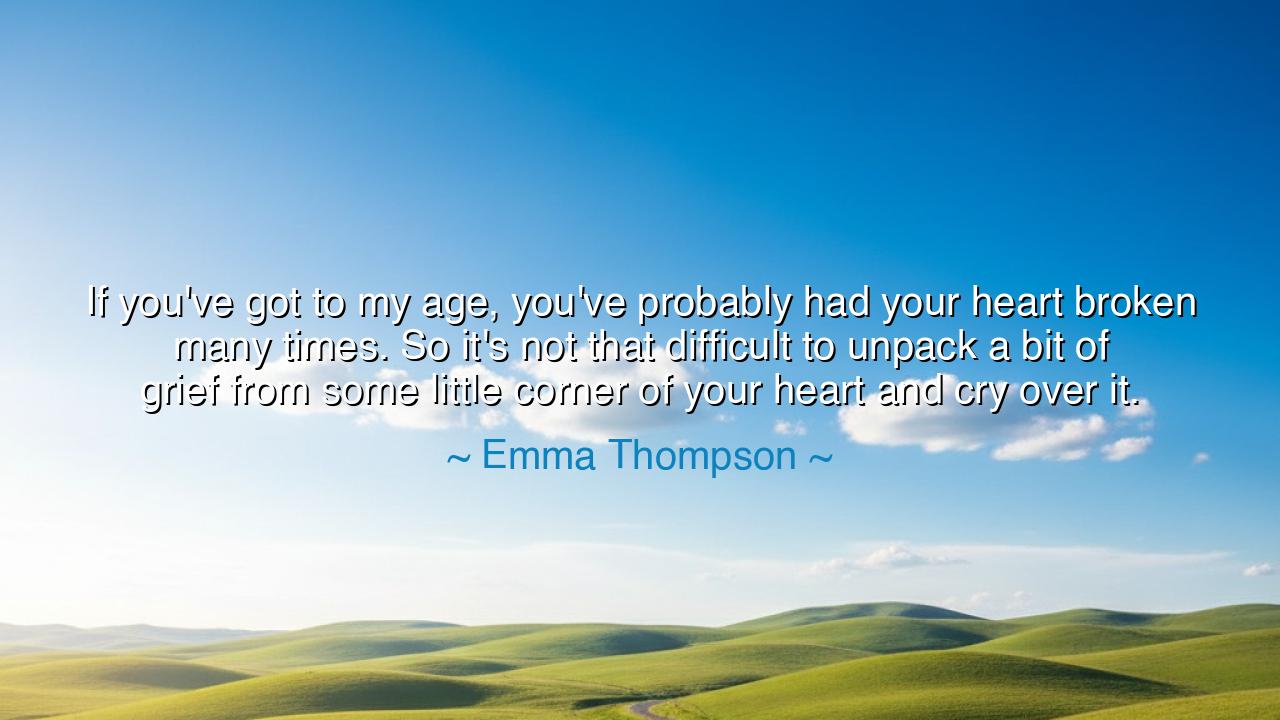
If you've got to my age, you've probably had your heart broken
If you've got to my age, you've probably had your heart broken many times. So it's not that difficult to unpack a bit of grief from some little corner of your heart and cry over it.






Hear the voice of Emma Thompson, a woman of great wit and deep humanity, who speaks with tender honesty: “If you’ve got to my age, you’ve probably had your heart broken many times. So it’s not that difficult to unpack a bit of grief from some little corner of your heart and cry over it.” In these words lies the recognition that sorrow is not a passing storm that vanishes, but a companion that walks beside us through life. Every love lost, every friendship ended, every disappointment endured leaves behind a trace, a corner in the heart where grief rests quietly, waiting.
Grief is not an enemy to be cast out but a thread woven into the fabric of life. Thompson’s words remind us that, with age, the heart becomes a great archive of joys and sorrows. We carry within us not only our triumphs but also our losses, and it takes but a small remembrance—a song, a place, a fleeting thought—to open that hidden chest and let tears flow. Far from weakness, this is the mark of a life fully lived: a heart that has dared to love often will inevitably break often, yet it remains alive and tender.
The ancients spoke much of this truth. The Greeks told of Niobe, who wept endlessly for her children taken by the gods. Her grief did not fade, but became part of her being, carved into stone itself. The Romans, too, believed that tears were not shameful, but honorable, the outward sign of love remembered. To cry over old sorrows is not to live in the past, but to affirm the depth of one’s humanity. For only those who have felt deeply can grieve deeply.
Consider the life of Abraham Lincoln. Behind his stern leadership in a time of war was a man known for his melancholy. He carried the sorrow of a lost love in his youth, the death of children, and the weight of a divided nation. At times, his heart would return to those hidden corners of grief, and yet from those depths arose his compassion, his patience, and his strength. His tears, though private, were a wellspring that softened his spirit even in the harshest of trials.
Thompson’s reflection also carries gratitude. For though grief remains, it is not always bitter. With the years comes a kind of intimacy with sorrow, an acceptance that tears may come but they do not destroy. To sit quietly and allow oneself to cry is to honor the life one has lived, to pay tribute to the loves and losses that shaped the soul. In this way, grief is transformed from a burden into a form of remembrance, a gentle reminder that the heart has not grown cold.
The lesson, then, is not to fear the weight of memory, nor to believe that sorrow must be erased. Instead, embrace the truth that a full life will always carry shadows as well as light. When you feel the ache of old wounds returning, do not resist. Let the tears fall, for they are proof that you once loved, that you once dared, that you once opened yourself to the beauty and the risk of being human.
Practical steps are clear: allow yourself moments of stillness, where you may honor both joy and loss. Keep a journal of memory, where the broken pieces of your heart can find expression in words. Share your stories with others, for grief becomes lighter when spoken. And do not harden yourself against tears—they are not signs of weakness but of strength, for only the courageous allow themselves to feel.
Thus remember Emma Thompson’s wisdom: the heart, by age, becomes a vessel of many sorrows. Do not despise those sorrows, for they are the price of love, and love is the greatest gift. To weep over old grief is not to live in the past, but to honor the journey. Accept it, embrace it, and let it remind you always that you have lived deeply, and therefore, you have lived well.






AAdministratorAdministrator
Welcome, honored guests. Please leave a comment, we will respond soon